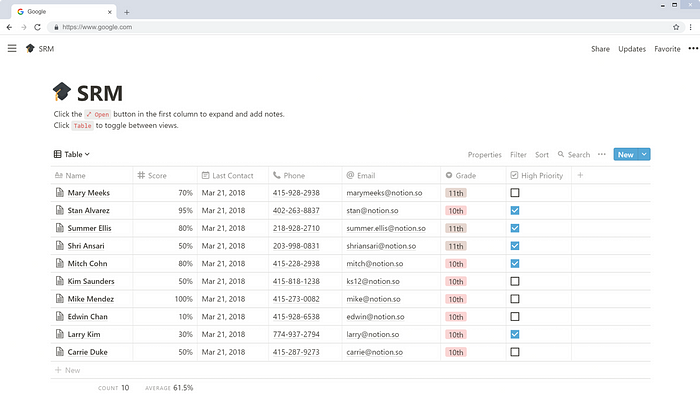5 Reasons Why Notion is Perfect for Educators
This software’s building-blocks approach has many use-cases for educators.
At the end of the ‘19-’20 school year, teachers were thrust into full-time, online learning positions. Immediately, lesson materials, activities, and student work had to be completed 100% online. With teachers utilizing technology in widely different ways, this posed a huge challenge; many teachers are still grappling with online or hybrid classes. longer than anyone anticipated.
To take a slightly more optimistic perspective, this past year has also required teachers and schools to re-evaluate practices, and how we can leverage technology to streamline teaching, planning, and administration.
Notion — a popular tool used amongst a growing number of startups and small companies — is a new type of software, in which individuals and teams can quickly create, collaborate, and organize large batches of data, using “blocks.” I think it can also revolutionize how teachers and schools plan, collaborate, and their work lives. It’s also free for educators.
Here are the top five use-cases for teachers.
Build a Lesson Plan Database
How often do you write super detailed lesson plans, only to have them disappear into Google Drive or shared folders? Rewriting lesson plans is a huge cause of wasted time, but is easily avoidable.
By creating a lesson plan database, you can organize and filter lessons unit, topic, grade level, or project. This Lesson Plans Template from Notion offers a basic example.

Organize Resources
If you teach K-12 or Higher Ed, odds are you’re often scouring the internet looking for readings, videos, or books. And it’s also probably that resources are saved on a computer, drive, app, or phone. Although tools like Pocket or Instapaper have gotten really good at organize and tagging resources, they still require maintenance to keep organized, and can quickly devolve into black holes of links.
In Notion, it’s possible to organize resources by topic, label their type (article, video, book), and even link to specific lessons or units.
This template is a great starting point for quickly saving and organizing teaching resources.

Create a Class Website
One gripe I often have with edtech tools is that they rarely integrate with each other, which means teachers are often having to duplicate documents, grades, and notes in multiple places.
Even though platforms like Google Sites or Wordpress have gotten more intuitive over the past few years, there’s still a learning curve for many teachers, and can easily be a stressful experience considering teachers’ workloads.
Here’s the basis for what we’re using this year for App Design. We use this page as a quick reference guide, as well as a space for students to organize their work, as a digital portfolio. (View Template)

Build Student Portfolios
There’s a lot of positives with using Google Classroom, but file organization can get messy. In one of our courses, I’m experimenting with student pages, in which each student adds snapshots of their work, along with descriptions of each project. This is a great opportunity for students to reflect on their work over weeks, units, or quarters. Working on a template for this one; hope to release it soon!
Track Student Progress
In my experience, the most clunky aspect of Student Relationship Management (SRM) has been logging communications or notes in a (typically) outdated, limited software that few teachers and staff reference.
What if, instead, there was an accessible, shared database of students, including communications, individualized goals, and contact info, all in the same page? This seems like a no-brainer. I’m working on a version of this template, tweaked to be more useful for teachers and admins.

It’s Still Early in the Dashboard Revolution
Considering Notion is only a few years old, it’s exciting to think of future functionality, especially with an API on the horizon.
What’s perhaps most exciting about using Notion in schools is the ability for education professionals to customize their own work dashboards with hardly any learning curve. Teachers have more responsibilities than ever before, and managing projects and resources across courses is often sidelined. Notion — and other burgeoning no-code platforms — can provide a much-needed solution for teachers to take control over their work and time.

